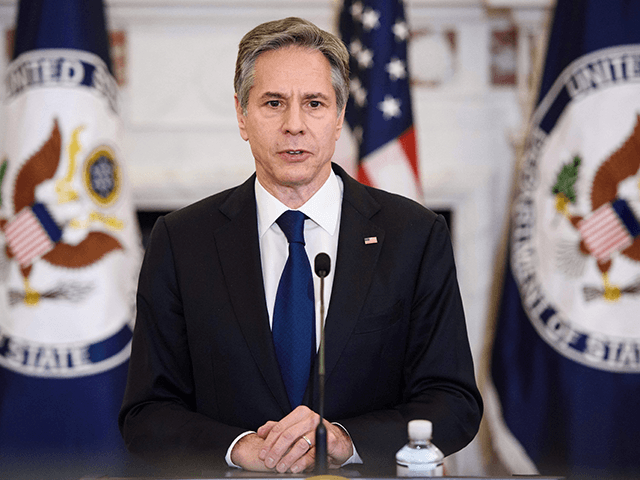China’s envoy to the United Nations, Zhang Jun, told reporters Monday that U.S. Secretary of State Antony Blinken gave a “positive” response to China’s invitation to attend a virtual U.N. Security Council summit on Friday.
The event will be the first convened by China as Security Council president, and the first encounter between Blinken and Chinese Foreign Minister Wang Yi since their March confrontation in Alaska.
China celebrated the Alaska meeting as a resounding defeat for Blinken, who offered some perfunctory criticism of Chinese human rights abuses and was stunned by a ferocious backlash from Wang and top diplomat Yang Jiechi. Wang and Yang used the rhetoric of Blinken’s own Democrat Party to argue that America lacks the moral standing to criticize China on human rights and asserted that, in the wake of the Wuhan coronavirus pandemic, the U.S. no longer has the economic or diplomatic strength to penalize Beijing for its abuses.
Blinken said in a Sunday interview that the Biden administration’s goal is “not to contain China, to hold it back, to keep it down,” but rather to “uphold this rules-based order that China is posing a challenge to.”
Blinken then admitted the Chinese government is more aggressive and repressive than ever, saying China “believes that it can be, and should be, and will be, the dominant country in the world,” but did not specify what actions the Biden administration intends to take in order to uphold the rules-based order, or even to prevent China from becoming the dominant world power.
The China-hosted Security Council summit on Friday, to be chaired by Wang Yi, will provide a test of whatever diplomatic strategy Blinken has in mind for making China into a more responsible world power.
The Chinese clearly see themselves as the leaders and guarantors of the “rules-based order,” not a challenge to it. The Chinese Communist Party (CCP) argues that Western ideas of using sanctions to enforce human rights ideals are a destabilizing force and threat to world order.
As the Diplomat explained Tuesday, China claims its model of international relations is more “equitable” and generous to the developing world than the American model it is displacing:
China has positioned itself as a champion for the equitable representation of the developing world, branding its approach to reform as “democratization” of the international system. As China’s former U.N. ambassador, Ma Zhaoxu, put it in a 2018 speech, “The rise of the developing countries as a group and the ascending power and influence of African states are prominent features of the international relations in the world we live now. The reform of the Security Council should reflect this reality.”
Similarly, China’s 2020 position paper on the 75th anniversary of the U.N. emphasized the “need to work for a new model of international development partnership that is more equitable and balanced, and consolidate the cooperation architecture with the UN at its core, North-South cooperation as the main channel and South-South cooperation as a supplement.”
It’s no coincidence that reforming the U.N. along these recommendations would have the net effect of raising the voices of developing countries, which China can often count among its allies. At the same time, such reform would deprioritize the liberal democracies in Europe and North America, which have played an outsized role in the U.N. since its inception — and today often use their platform to criticize China, particularly over human rights issues.
China assumed the rotating presidency of the Security Council on Monday and promptly called on the U.S. to ease sanctions on North Korea, with envoy Zhang Jun saying Beijing hopes the Biden White House will “give more importance to diplomatic efforts, to dialogue, instead of emphasizing too much the importance of extreme pressure.”
The South China Morning Post (SCMP) noted Blinken spent Tuesday at a meeting with G7 nations to discuss the “collective challenges” they face from China. Japan is the only G7 nation that has yet to impose sanctions against Beijing for its oppression of the Uyghur Muslims.
Hopefully Blinken used the Tuesday G7 meeting to prepare for Round Two against Wang Yi, although the State Department refused to answer questions about Blinken’s agenda for the Friday U.N. Security Council meeting or whether he plans to confront China on human rights issues.
Chinese analysts told the SCMP that Wang will use the meeting to lecture the United States on returning to the “U.N. framework” and “rules-based international order” as Beijing sees it, pushing back against the U.S. for its “pseudo form of multilateralism” and its habit of forming “cliques” to contain the ambitions of China and Russia.
Zhang said the Friday meeting is the “first priority” of China as Security Council president, and expected attendees to include “quite a number” of foreign ministers from the 15 Security Council members.
“It’s becoming more and more evident that in tackling the current global crises, multilateralism represents the right way out,” Zhang said. “Multilateralism is not an option but a necessity as we build back better for a more equal, more resilient, and more sustainable world. The United Nations must be at the center of our efforts.”
He said China hopes “members will have the opportunity to reaffirm their support to multilateralism, to practice real multilateralism, and then to give stronger support to the role of the United Nations and to defend the international system with the United Nations sitting at the center, and also to support international order based on international law.”
Zhang’s comment about “real multilateralism” ties into the Chinese analysts complaining to the SCMP about America’s “pseudo form of multilateralism” to give an idea of the reception awaiting Blinken when he logs into the Security Council virtual summit. Blinken and his team have had two months to come up with a better response to Beijing’s aggressive posture than their flummoxed performance in Alaska.

COMMENTS
Please let us know if you're having issues with commenting.